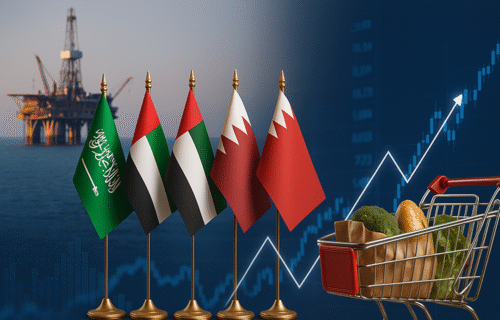Inflation across the Gulf Cooperation Council (GCC) remained largely stable through the third quarter of 2025, despite ongoing geopolitical uncertainty and disruptions in global trade, according to Kamco Invest’s GCC Inflation Update. The report attributes this price stability to higher oil production, easing energy prices, and disciplined fiscal policies across the region.
The International Monetary Fund (IMF) projects inflation in the GCC to stay close to or below the 2% target through 2026, with rates averaging 1.7% in 2025. The easing trend is supported by lower energy costs and stronger monetary control, even as tariff changes and supply-chain adjustments continue to shape global inflation patterns.
Kamco Invest’s analysis shows that while global inflationary pressures persisted — particularly in advanced economies such as the United States, where inflation reached 3% in September 2025 — the GCC maintained relative price stability. Central banks across Saudi Arabia, the UAE, Qatar, Bahrain, and Oman followed the U.S. Federal Reserve’s 25-basis-point rate cut in October, easing borrowing conditions across the region. Kuwait, however, kept its policy rate unchanged.
Saudi Arabia’s annual inflation stood at 2.2% in September 2025, with modest month-on-month fluctuations. Housing and utilities prices rose 5.2%, while personal goods and services increased by 7.7%. In the UAE, consumer prices rose 2.9% year-on-year, driven by a 5.8% increase in housing and utility costs. Bahrain recorded the lowest inflation rate in the GCC, with consumer prices unchanged year-on-year, while Qatar and Oman each registered moderate price growth of 1.1%.
The report also highlighted stabilising trends in global commodity markets. The Food and Agriculture Organization’s (FAO) Food Price Index fell 19.6% from its 2022 peak, as falling cereal, dairy, and sugar prices offset higher meat costs. Increased oil production among OPEC+ members — up nearly 1.1 million barrels per day since February — further contributed to reduced transportation and energy costs.
Kamco Invest’s analysts concluded that the region’s inflation outlook remains favourable. Continued fiscal prudence, moderate energy prices, and the expansion of oil supply are expected to help the GCC maintain price stability through 2026, even as global economies navigate slower growth and elevated borrowing costs.
Source: GCC
